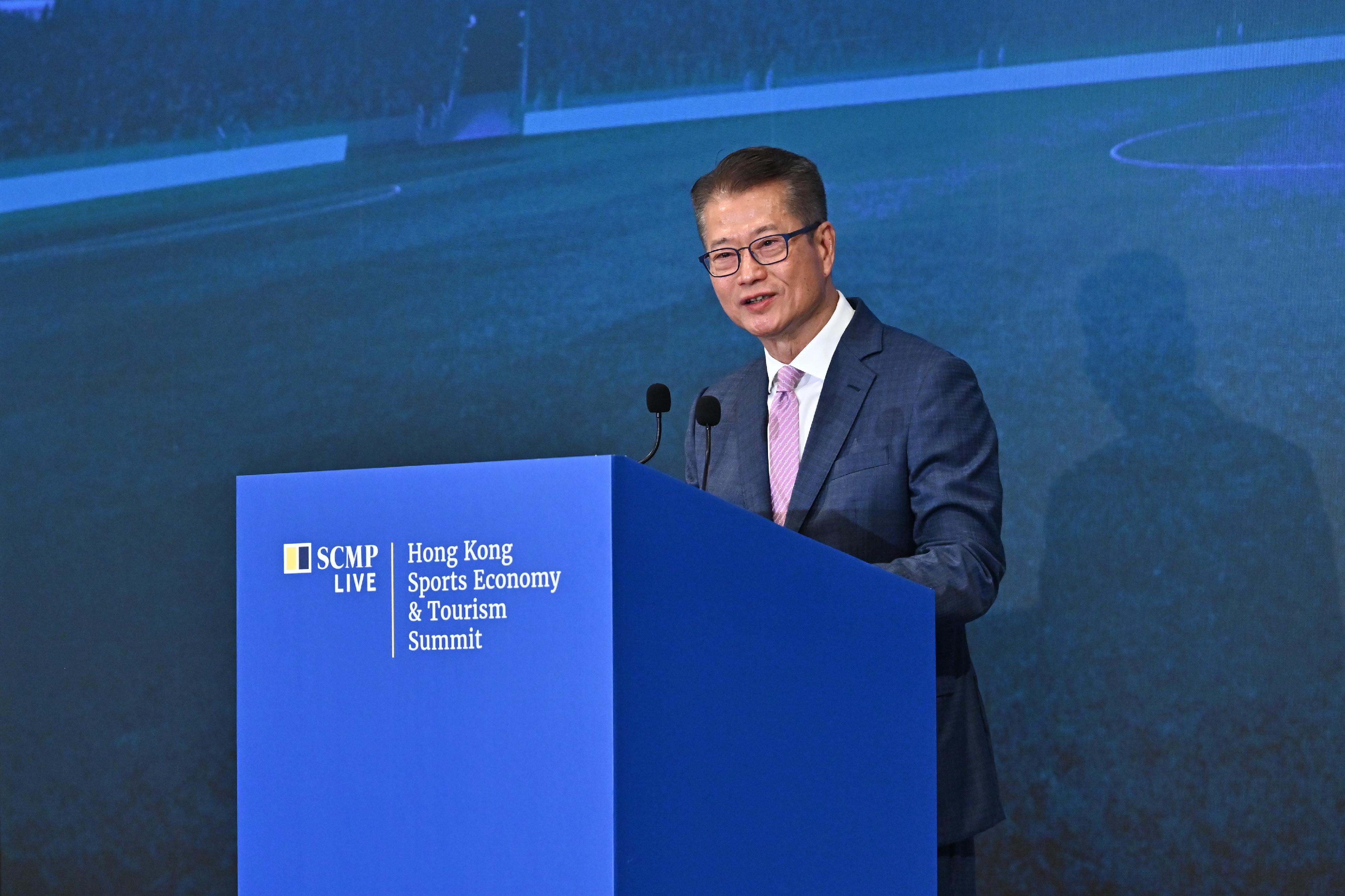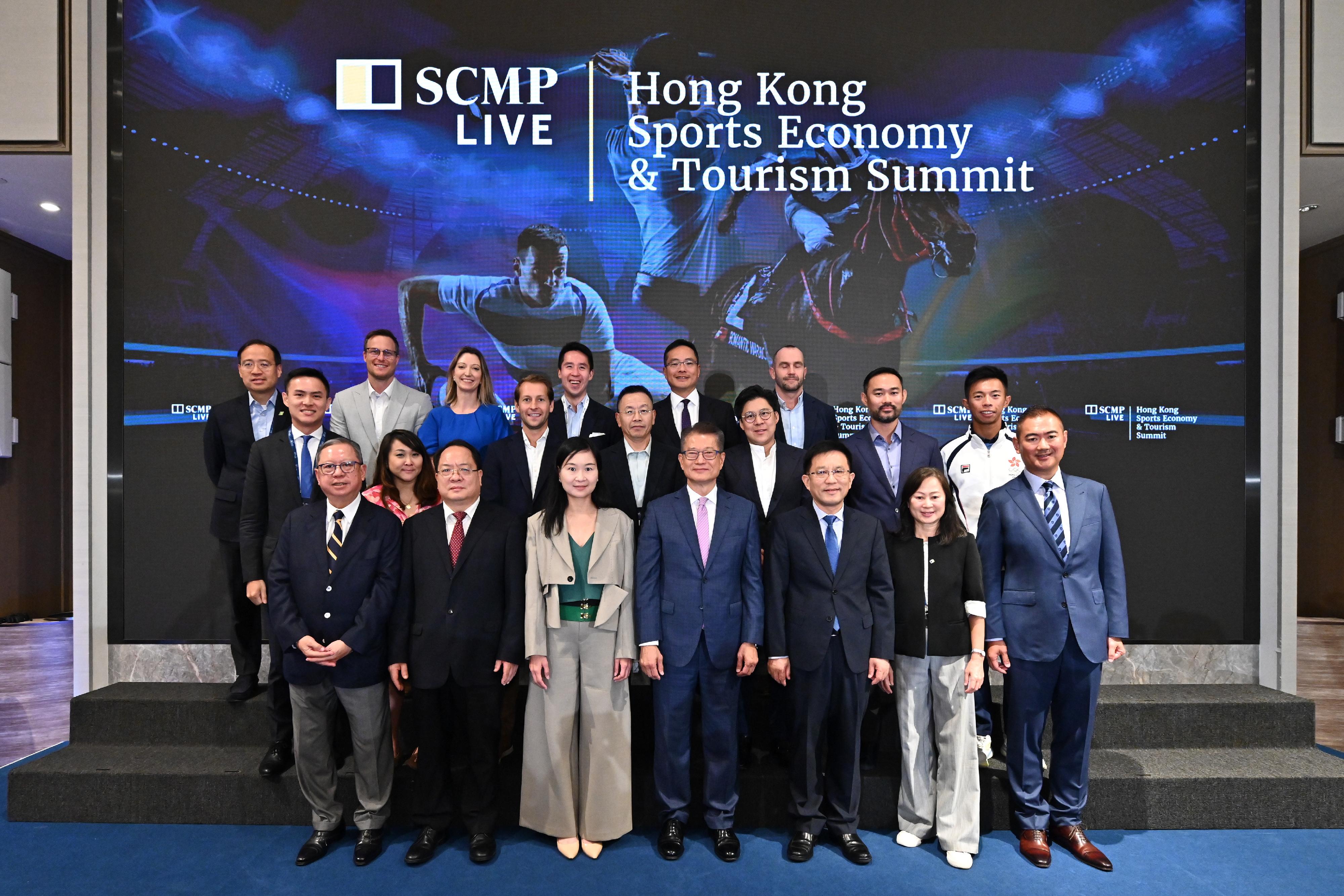Speech by FS at Hong Kong Sports Economy & Tourism Summit (English only) (with photos/video)
Following is the speech by the Financial Secretary, Mr Paul Chan, at the Hong Kong Sports Economy & Tourism Summit today (September 6):
王�苗秘書長 (Secretary General of the Liaison Office of the Central People's Government in the Hong Kong Special Administrative Region (HKSAR), Mr Wang Songmiao), 潘雲�副特派員 (Deputy Commissioner of the Office of the Commissioner of the Ministry of Foreign Affairs of the People's Republic of China in the HKSAR Mr Pan Yundong), Catherine (Chief Executive Officer of the South China Morning Post, Ms Catherine So), Tammy (Editor-in-Chief of the SCMP, Ms Tammy Tam), Peter (President of the Hong Kong Golf Club, Dr Peter Lam), distinguished guests, ladies and gentlemen,
Good afternoon. It is my great pleasure to join SCMP's Hong Kong Sports Economy and Tourism Summit. Despite the typhoon, I am delighted to see so many of you here. You have truly demonstrated your passion for sports.
The remarkable performances of athletes from Hong Kong and our country at the Paris Olympics and Paralympics have ignited a widespread enthusiasm for sports. While much discussion has focused on supporting local sports development, there is still much space to be filled, regarding how to harness sports as a driver for tourism and the economy. This makes today's Summit particularly timely.
Economic benefits of sports tourism
Sports tourism is a rapidly growing sector globally, capturing the attention of governments, authorities, and NGOs alike. The United Nations World Tourism Organization estimates that sports tourism accounts for approximately 10 per cent of global tourism spending, with projections indicating an annual growth rate of over 17 per cent between 2023 and 2030. Clearly, this is a high-growth area.
Of course, countries around the world not only recognise the economic advantages of investing in sports, but more importantly the social benefits of sports – primarily for enhancing the health and well-being of their citizens. Improved physical health and fitness, as well as mental health of citizens, through sports help generate positive energy in our community, resulting not just in lower medical expenses, but lower social cost for society as a whole.
And not to mention the power of sports in uniting a people, a city and a country.
Across the globe, economies are leveraging major sporting events to rejuvenate their cities through infrastructure development, city branding, and sports tourism. The recent Paris Olympics and Paralympics are a prime example, where the events have been deeply integrated into the city. Who could resist the allure of a beach volleyball game under the Eiffel Tower, or an equestrian competition at the Château de Versailles?
Economically speaking, the Paris Olympics are estimated to generate as much as 11.1 billion euros in net economic benefits, with 2.8 billion euros expected from tourism revenue alone.
The transformative impact is also evident in cities like Hangzhou, which hosted the Asian Games last year. And Zhangjiakou too, where visitor numbers surged sixfold following the Beijing Winter Olympics in 2022.
Indeed, our country fully recognises the potential of sports tourism. The 14th Five-Year Tourism Development Plan identifies sports as one of the key components of tourism. It has set out concrete plans to build high-quality sports tourism routes and demonstration zones.
Our country is committed to integrating culture and tourism, encapsulated in the Chinese phrase "以文塑旅�以旅彰文", that is "shaping tourism with cultural activities and promoting culture through tourism". I think this same principle applies to sports, where we will shape tourism with sports, or "以體塑旅".
Hong Kong's efforts
The global experience offers valuable insights for our city. We understand the significance of sports in attracting tourists, enhancing our city's brand, and boosting the economy.
A prime example is Hong Kong Sevens, which attracted 75 000 visitors last year, with 40 per cent being international tourists.
I want to share that during the peak of the COVID pandemic in Hong Kong back in February 2022, amid unprecedented challenges, we made a bold decision to back the return of Hong Kong Sevens in November that year, after a two-year hiatus. The decision was not an easy one, but was made out of our firm belief that mega sports events play a crucial role in helping us re-embrace and reconnect with the rest of the world.
We are also eager to welcome new events, such as LIV Golf which has emerged as a new brand for our city. This year, the tournament featured 54 top golfers, including 14 major champions, and was broadcast in 110 countries, attracting visitors from around 30 nations. I am pleased to note that it will be returning in March next year.
The fact that LIV Golf is a widely respected professional event backed by Saudi Arabia's Public Investment Fund exemplifies how sports can connect diverse places, people, and institutions. I want to extend my gratitude to LIV Golf, and the Hong Kong Golf Club, for making it happen.
We will continue to support the hosting of more high-quality international major sports events, given their significant benefits to our community and economy.
World-class infrastructure: Kai Tak Sports Park
Beyond hosting a diverse array of events, Hong Kong is actively investing in top-notch sports infrastructure. The Kai Tak Sports Park represents our city's most significant investment in sports facilities in recent decades. Set to open in the first half of 2025, it will include a main stadium that could accommodate 50 000 spectators, as well as ancillary training and support facilities for our athletes. Together, they will create a platform for world-class sports competitions and entertainment events.
However, let us regard the Kai Tak Sports Park not just as a collection of facilities but as a vibrant theatre that connects people, places, cultures, and possibilities. We envision this new landmark to become an international spotlight, and a popular destination for events, offering unparalleled experiences.
The key lies in the content. It is essential to ensure that the events and programmes would cater to the needs and interests of both local residents and international visitors. Effective marketing of these events is also crucial for attracting participation. When people flock to events, businesses will naturally follow.
Looking ahead
But certainly, we can do more if we are to better harness the opportunities presented by sports events. Allow me to share two quick thoughts.
First, there is a strong case for further synergising sports events with MICE (Meetings, Incentives, Conferences, and Exhibitions), large-scale festivals, and other tourism elements, such as dining, culture, theme parks, and in-depth explorations of the city. The goal is to offer a more diverse range of experiences for business travellers and tourists, giving them more reasons to visit Hong Kong, or if they are already planning to come, to extend their stay.
A good example was the return of Hong Kong Sevens in November 2022, as I alluded to earlier, which was held back-to-back with our inaugural Global Financial Leaders' Investment Summit. Many participating chairpersons and CEOs of global financial institutions stayed behind to join Hong Kong Sevens, bringing along their local colleagues and clients. The response was overwhelmingly positive.
Second, we can draw inspiration from the Paris Olympics and Paralympics, which serve as a compelling example of how sports can be seamlessly integrated into a city's fabric. This should encourage us to take a fresh look at Hong Kong. We boast a world-class harbour, a countryside filled with spectacular walking trails, and many scenic outlying islands with stunning coastlines. Are there new possibilities in sports that we can explore together? Let's think big.
Concluding remarks
Ladies and gentlemen, as we conclude today's Hong Kong Sports Economy & Tourism Summit, let's reflect on the invaluable insights we've gained from our panels and discussions. From exploring global trends in sports tourism to examining the impact of the Olympics on our economy, you have given some good thoughts to the roadmap of enhancing Hong Kong's sports economy. These insights will serve as important reference for the Government as we move forward. What is now required is transforming shared vision into actionable steps that will elevate Hong Kong as a leading sports destination in Asia and beyond. Thank you very much indeed.

